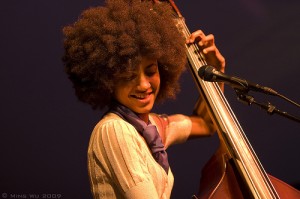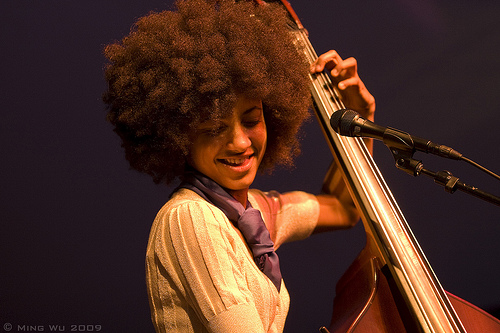By Ali Siemens (Staff Writer) – Email
 This year’s 2011 Grammy winner for Best New Artist, Esperanza Spalding, beat out four other popular artists including, Justin Bieber, Drake, Florence and the Machine, and Mumford in Sons for the honour. Following the big win, the twenty-seven-year-old jazz artist has no intention of slowing down her music career.
This year’s 2011 Grammy winner for Best New Artist, Esperanza Spalding, beat out four other popular artists including, Justin Bieber, Drake, Florence and the Machine, and Mumford in Sons for the honour. Following the big win, the twenty-seven-year-old jazz artist has no intention of slowing down her music career.
Spalding’s last album was released in August 2010, Chamber Music Society, along with Esperanza in 2008 and Junjo in 2006. The young musician is currently working on another album that will be released in late 2011 titled Radio Music Society.
Although not all Grammy followers were happy with Spalding winning the award for best new artist, including Canadian artist Justin Bieber, Spalding has dreams for the jazz music she loves being enthusiastically supported by many.
The trilingual singer picked up the upright double bass at age fourteen and knew it was her calling. Spalding was asked why she plays the bass instead of the original instrument she learned on, the cello: “it wasn’t a choice, but the bass had its own arc and resonated with [me],” she said.
Listening to Spalding’s album Chamber Music Society, it is obvious she was right about this instrumental calling. In her song “Little Fly,” Spalding’s voice is intoxicating. Her ability to properly represent the blues and jazz era, as well as hit the high notes with her obviously strong ability as a soprano, leaves no questions about her recent win at the Grammy’s.
A powerful aspect to Spalding’s talent is her ability to meld together her instrumental ability with her strong voice. As the listener, it’s difficult to say which area she is stronger in because both areas are so perfectly developed.
Spalding prides herself on her musical ability and being recognized solely for her musicianship. In an interview in 2008, Spalding mentioned that, “female musicians must take responsibility to avoid over-sexualizing themselves.” Spalding is conscious of this decision, focusing on her music and not appeasing the music industry’s thirst for sexy musicians. She wants to be known for her talent, not her sex appeal.
Even though Spalding strays from the sexualized aspect of the music industry, her attitude does not take away from her feminine appeal in both appearance and voice. In other songs on her 2010 album, “Wild is The Wind” and “Really Very Small,” her voice carries both high and low, reaching all ranges on the musical scale. Along with her feminine voice, her lyrics contain the same feminine interest, often including topics of love, relationships, and the body.
With each discovery of the singer-songwriter’s music, the energy emitted in her music leaves her audience asking for more. Spalding isn’t only being recognized by an everyday fan base, she was invited by President Barack Obama personally to perform at the Nobel Peace Prize concert and at an event to honour the 2009 Laureate, Obama himself.
Spalding has made a quick rise to stardom, admired by both everyday fans and highly recognized celebrities. With everyone anxiously awaiting her newest album release, Spalding’s success in the music industry is bound to get better. Listen for the release of Radio Music Society later in the year and be ready to melt as you are taken over by the voice of a new star.


